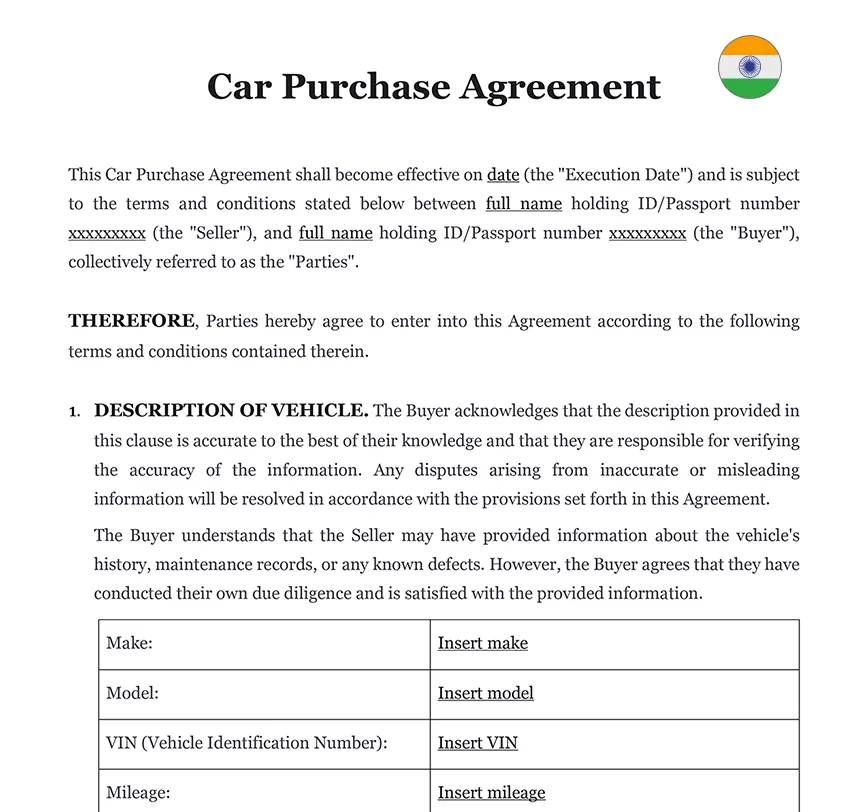Ready to use legal template
Drafted by experienced lawyers
Compliant with Indian law
Ready to use legal template
Drafted by lawyers
Compliant with Indian law
Home › Business contracts › Car Purchase Contract
Learn more about Car Purchase Contract in India
When buying or selling a car in India, it is essential to understand the legal aspects and protect your rights throughout the transaction. A Car Purchase Contract, also known as a Vehicle Sale Agreement, plays a crucial role in ensuring a smooth and legally binding car purchase process. This page aims to provide valuable insights into Car Purchase Contracts in the context of Indian law. A Car Purchase Contract is a legally binding document that establishes the terms and conditions of a car sale transaction between a buyer and a seller. It serves as a written agreement that outlines the rights, obligations, and responsibilities of both parties involved. Understanding the key elements and clauses of a Car Purchase Contract is vital to safeguard your interests and avoid potential disputes.
📄 Related documents
Table of contents
Why use a Car Purchase Contract?
A vehicle acquisition agreement is essential when buying a car in India. It provides a legally binding framework that safeguards the interests of both the buyer and the seller. By using a car purchase contract, individuals and businesses can establish clear terms and conditions for the transaction, including price, payment terms, delivery, and warranties. This document ensures transparency, reduces the risk of disputes, and provides legal protection in case of any issues or disagreements that may arise during or after the car purchase process. Utilizing a car acquisition agreement is highly recommended to facilitate a smooth and secure vehicle transaction in India.
What is included in a Car Purchase Contract?
The key components included in a Car Purchase Contract are as follows:
1. Identification of Parties: The contract begins by clearly identifying the buyer and the seller involved in the transaction. This includes their legal names, contact information, and any relevant identification or registration numbers.
2. Vehicle Information: The Car Purchase Contract includes comprehensive details about the vehicle being sold. This typically comprises the make, model, year of manufacture, color, VIN (Vehicle Identification Number), license plate number, and any other relevant identification details.
3. Purchase Price: The contract specifies the agreed-upon purchase price for the vehicle. It outlines whether it is a fixed amount or subject to negotiation, and may include provisions for any applicable taxes, fees, or additional costs.
4. Payment Terms: This section outlines the payment terms and conditions agreed upon by the buyer and the seller. It covers aspects such as the payment method (cash, bank transfer, etc.), whether it will be a lump sum or installment payments, and the schedule for payment completion.
5. Conditions of the Sale: The Car Purchase Contract may include specific provisions regarding the condition of the vehicle at the time of sale. It may cover warranties or guarantees provided by the seller, as well as any disclosures of known defects or issues with the vehicle.
6. Transfer of Ownership: This section addresses the transfer of ownership rights from the seller to the buyer. It outlines the responsibilities of both parties in completing the necessary documentation, such as the transfer of vehicle registration and insurance.
7.Additional Terms and Conditions: Depending on the specific requirements of the buyer and the seller, the Car Purchase Contract may include additional terms and conditions. These can cover various aspects such as delivery arrangements, vehicle inspection, arbitration or dispute resolution procedures, and any other mutually agreed-upon provisions.
By including these crucial details, a Car Purchase Contract ensures transparency, protects the interests of both parties, and provides a clear framework for a successful car sale transaction. It is important for both the buyer and the seller to carefully review and understand all the terms and conditions outlined in the contract before signing it. Seeking professional legal advice is recommended to ensure compliance with relevant laws and regulations.
How to write a Car Purchase Contract?
When composing a contract for the acquisition of an automobile, it is crucial to incorporate essential elements to ensure a thorough and legally binding agreement. Begin by including comprehensive details about the parties involved, such as the purchaser and seller, along with their contact information. Provide a clear and precise description of the vehicle, including its brand, model, year of production, and unique identification number. Specify the agreed-upon purchase price and any additional charges, such as taxes or registration fees. Clearly outline the terms of payment, including the chosen method and the stipulated timeframe.
Incorporate provisions concerning any warranties or guarantees, clearly specifying their duration and coverage. Address the transfer of ownership by including a clause that stipulates the transfer occurs upon full payment. It is advisable to include provisions for inspection and the option to conduct a mechanical assessment.
Define the conditions for any potential contingencies, such as a financing provision or the requirement of a valid driver’s license. Include clauses for dispute resolution, such as mediation or arbitration, to address any potential disagreements.
To ensure clarity and avoid misunderstandings, employ concise and unambiguous language throughout the contract. Seek legal guidance or consult a professional to ensure compliance with relevant laws and regulations when drafting the agreement. Finally, both parties should thoroughly review the contract before signing and retain a copy for their records.
By creating a comprehensive and well-crafted agreement for the purchase of a vehicle, individuals can safeguard their interests and establish a transparent and mutually advantageous transaction.
What to do if one party refuses to sign?
If one party refuses to sign the agreement, it is essential to assess the situation and consider possible actions. Firstly, communication should be initiated to understand the reasons behind the refusal and explore potential resolutions. It may be necessary to negotiate and address any concerns or misunderstandings. If the refusal persists, seeking legal advice is advisable to determine the available options and potential consequences. Depending on the circumstances, alternative solutions could include revising the contract terms, engaging in mediation or arbitration, or considering alternative business arrangements. It is crucial to prioritize open communication, professional conduct, and adherence to legal requirements throughout the process.
What are the advantages of a Car Purchase Contract?
A Car Purchase Contract offers several advantages for both the buyer and the seller involved in the transaction. Some key advantages of a Car Purchase Contract include:
1. Clarity and Protection: The contract outlines the terms and conditions of the car sale, providing clarity and protection for both parties. It specifies details such as the purchase price, vehicle description, payment terms, warranties, and any additional agreements. This ensures that all parties involved are aware of their rights, responsibilities, and the agreed-upon terms.
2. Legal Validity: A Car Purchase Contract holds legal validity and can serve as evidence in case of any disputes or disagreements that may arise during or after the transaction. It helps establish a legally binding agreement between the buyer and seller, promoting a sense of trust and security.
3. Consumer Rights: The contract may include provisions that safeguard the buyer’s consumer rights, such as warranty information, disclosure of vehicle history, and guarantees against undisclosed damages or faults. It provides assurance to the buyer that they are protected in case of any issues with the purchased vehicle.
4. Seller’s Liability: By documenting the sale in a Car Purchase Contract, the seller assumes liability for the accuracy of the information provided, ensuring that they are accountable for any misrepresentation or false claims about the vehicle’s condition, mileage, or ownership history.
5. Financing and Insurance: A Car Purchase Contract can serve as supporting documentation when obtaining financing or insurance for the vehicle. Lenders and insurers may require a formal agreement to assess the value of the car, determine coverage options, or approve loan applications.
Overall, a Car Purchase Contract brings transparency, legal protection, and peace of mind to both buyers and sellers involved in a car sale, ensuring a smoother and more secure transaction.
Can a Car Purchase Contract be terminated?
An automobile purchase contract, can be terminated in various situations. Termination may occur through mutual agreement between the buyer and seller, where both parties willingly decide to end the contract. Another circumstance is when there is a breach of the agreement, such as non-payment or failure to deliver the vehicle, which gives the innocent party the right to terminate the contract. Additionally, termination can happen due to force majeure events like natural disasters or government actions, or if there are legal issues or violations involved in the transaction. Understanding the termination provisions outlined in the contract and seeking legal advice can help navigate the process effectively.
Car Purchase ContractTemplate (.docx)
Save on attorney fees
310 client reviews (4.8/5) ⭐⭐⭐⭐⭐
Share information
Why Themis Partner ?
Make documents forhundreds of purposes
Hundreds of documents
Instant access to our entire library of documents for India.
24/7 legal support
Free legal advice from our network of qualified lawyers.
Easily customized
Editable Word documents, unlimited revisions and copies.
Legal and Reliable
Documents written by lawyers that you can use with confidence.




